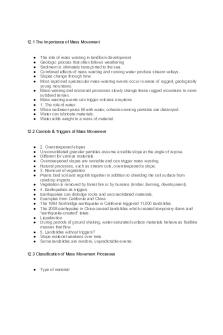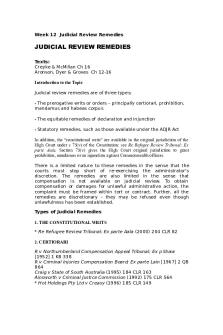Attempts (IO) - Lecture 12 PDF

| Title | Attempts (IO) - Lecture 12 |
|---|---|
| Author | Muhammad Talha Mushtaq Ghick |
| Course | Criminal law |
| Institution | University of London |
| Pages | 2 |
| File Size | 95.1 KB |
| File Type | |
| Total Downloads | 227 |
| Total Views | 918 |
Summary
Inchoate Offences: Attempts 2013Inchoate means ‘just begun’ or ‘incomplete’. Inchoate offences are where the full offence is not completed. The reason that the law fixes liability on D’s who have not fulfilled the full offence is to punish those who are willing to be involved in criminality even whe...
Description
Inchoate Offences: Attempts 2013 Inchoate means ‘just begun’ or ‘incomplete’. Inchoate offences are where the full offence is not completed. The reason that the law fixes liability on D’s who have not fulfilled the full offence is to punish those who are willing to be involved in criminality even where the full offence is not, for one reason or another, completed. The law governing conspiracy is the subject of a recent Law Commission Consultation Paper (2007) and report in December 2009 (LC318). Inchoate liability is liability for an incomplete crime. Inchoate liability is often justified because D as demonstrated a willingness to be involved in, assist or encourage, or take the steps towards a crime. If the full offence is carried out by D, he may be liable as the perpetrator, but will not be liable for the inchoate offence as well. If the full offence is carried out by another, D may be liable as an accessory for principal offence. Inchoate liability is separately to either of these types of liability. Attempts: An attempt is where the D has tried unsuccessfully to commit an offence. The maximum sentence is the same as if he D had committed the full offence. ‘In the exam you must explain what offence D has attempted to commit’. Section 1 Criminal Attempts Act 1981 provides: (1) If, with intent to commit an offence … a person does an act which is more than merely preparatory to the commission of the offence, e is guilty of attempting to commit the offence. (2) A person may be guilty of attempting to commit an offence to which this section applies even though the facts are such that the commission offence is impossible. (Covers everything but attempting to commit a summary offence, conspiracy and attempting to become an accomplice) Actus Reus: Where the line between an act (not an omission) done in preparation and an act which is more than merely preparatory is one of fact, and accordingly has caused some apparently inconsistent decisions. Guilty: See: Boyle & Boyle [1987], and Tosti & another [1997]. Not Guilty. See: Widdowson [1986], Jones [1990], Campbell [1991], Geddes [1996], and Nevard [2006]. Mens Rea:
1
Criminal Law – Year 2!
Inchoate Offences: Attempts 2013 Because an attempt is, by definition, not the full offence, it is the MR that I crucial because it can turn an apparent accident into a crime. The MR for attempts is:
Intention in respect of the conduct or the consequences of the full offence; and (Where he full offence is defined as reckless in respect of any circumstances) recklessness in respect of any circumstances. See: Khan [1990]
Therefore, it is intention to commit the full offence, the MR for attempted murder is intention to kill as opposed to intention to cause really serious harm. See: Perman [1984], Walker & Hayles [1990], Millard & Vernon [1987], and Mousir [1987].
Impossibility: This is a common law principle and not based on statute. Under certain circumstances impossibility can amount to a defence. (1) D believes his activity is criminal but is in fact legal = R v Taafe [1984]. Simply no offence. (2) The methods used or suggested are inadequate to commit the offence = inadequacy impossibility (D liable). Impossibility in fact: a. Conduct conspired/attempted is an offence, but unknown to D an essential element of the offence is missing = legal impossibility = Anderton v Ryan [1985] b. The subject matter of the offence does not exist = physical impossibility.
Impossibility & Attempt: S. 1(2): D is guilty of an attempt even if it is impossible to commit the criminal act. Impossibility & Conspiracy: S.1 (1) (b): D is guilty of conspiracy even if it is impossible to commit the criminal act.
2
Criminal Law – Year 2!...
Similar Free PDFs

Attempts (IO) - Lecture 12
- 2 Pages
![[10-12-18] IO Reviewer](https://pdfedu.com/img/crop/172x258/g69rn8pp15ny.jpg)
[10-12-18] IO Reviewer
- 43 Pages

Conspiracy (IO) - Lecture 11
- 2 Pages

Criminal Attempts
- 3 Pages

Law5001 Topic 7 - Attempts
- 4 Pages

SST102 Examination Attempts Combined
- 64 Pages

Chapter 12 IO PSYC H Reviewer
- 4 Pages

12 - Lecture notes 12
- 3 Pages

Criminal Attempts Act 1981
- 1 Pages

Exam Attempts 2016-2020
- 36 Pages

Notes Criminal Attempts Act 1981
- 5 Pages

Lecture notes, lecture 12
- 9 Pages

Lecture notes, lecture 12
- 7 Pages
Popular Institutions
- Tinajero National High School - Annex
- Politeknik Caltex Riau
- Yokohama City University
- SGT University
- University of Al-Qadisiyah
- Divine Word College of Vigan
- Techniek College Rotterdam
- Universidade de Santiago
- Universiti Teknologi MARA Cawangan Johor Kampus Pasir Gudang
- Poltekkes Kemenkes Yogyakarta
- Baguio City National High School
- Colegio san marcos
- preparatoria uno
- Centro de Bachillerato Tecnológico Industrial y de Servicios No. 107
- Dalian Maritime University
- Quang Trung Secondary School
- Colegio Tecnológico en Informática
- Corporación Regional de Educación Superior
- Grupo CEDVA
- Dar Al Uloom University
- Centro de Estudios Preuniversitarios de la Universidad Nacional de Ingeniería
- 上智大学
- Aakash International School, Nuna Majara
- San Felipe Neri Catholic School
- Kang Chiao International School - New Taipei City
- Misamis Occidental National High School
- Institución Educativa Escuela Normal Juan Ladrilleros
- Kolehiyo ng Pantukan
- Batanes State College
- Instituto Continental
- Sekolah Menengah Kejuruan Kesehatan Kaltara (Tarakan)
- Colegio de La Inmaculada Concepcion - Cebu


